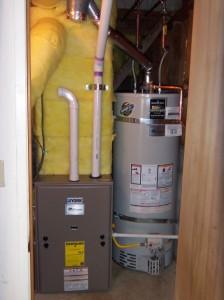What would you rather do: Call an East Bay HVAC company after your furnace has failed in the middle of winter; or set up a simple HVAC inspection regimen right now?
If you’re looking to save money, time, and aggravation, the answer is simple: set up some inspection processes.
HVAC systems are complex, and you may have no desire (or capacity) to understand what goes on inside them, technically speaking. You shouldn’t be expected to do a 100% thorough job, but you can get much of the way there by following these seven tips.
How to Check Your Home HVAC System
 1. Look at (and possibly clean or replace) your filters.
1. Look at (and possibly clean or replace) your filters.
The air coming back in your HVAC system goes through (or at least should go through) filters. You should check these every month. If they are contaminated with lots of dirt and dust, you can usually rinse or vacuum them out, or toss them and put in new disposable filters.
2. Take a look at the ductwork.
The ductwork carries the heated (or cooled) air through your home or building. If you see obviously ripped sections, dirt, or loose seams, those “red flags” should get you on the phone with a trusted Castro Valley air conditioning team.
3. What color is your furnace flame?
Is it blue? Is it consistent? If it’s not — if it’s flickering on and off or if it looks orange or yellow — you may need a professional inspection.
4. Is your thermostat filthy?
Thermostats can break down when they get gunked up with dirt, spiderwebs, dust, etc. Use a Q-tip or soft cloth to clean out the thermostat.
5. Are your A/C compressor blades bent or damaged?
Leaves and plants can easily obstruct A/C compressors. If the fins are bent or otherwise damaged, efficiency obviously suffers. Avoid trying to “unbend” the blade by yourself. First of all, you could hurt yourself. Second of all, you could further damage the compressor.
6. If you notice any obvious changes in your home — such as strange new drafts, bad smells from the ductwork, weird noises, etc. — make note of them and get help sooner than later.
7. The cost of fixing an incipient HVAC problem (such as a clogged or leaky air duct) is a lot less than the cost of patching up a problem that’s already gotten out of control (like a leak that’s spread and corroded your basement stairs).
Call the team here at B.A. Morrison for expert East Bay HVAC repair. We will help you understand and get the most out of your heating and air conditioning system, save money, and prevent future aggravation.

















